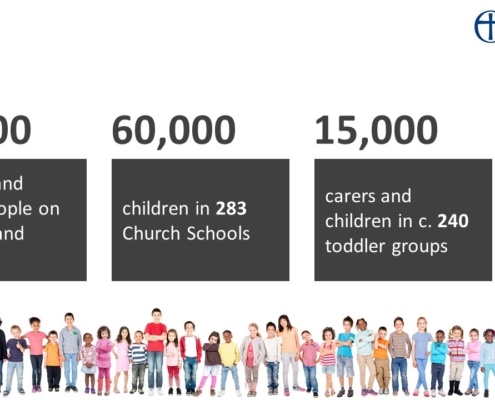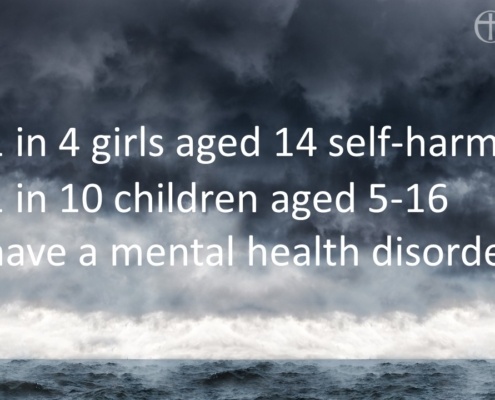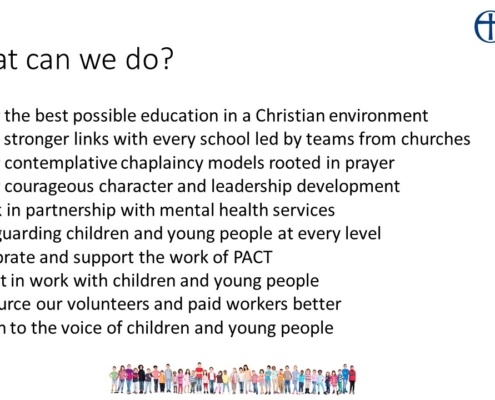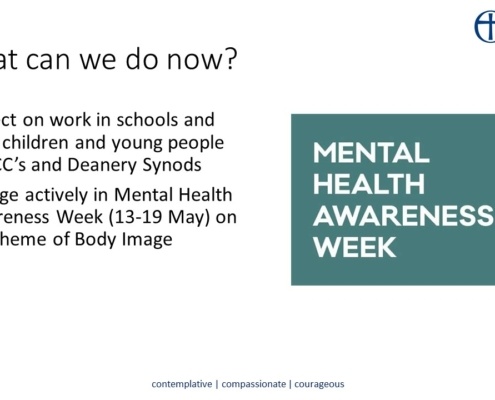I want to focus today on the importance of our work with children and young people across the Diocese of Oxford.
We have a tremendous opportunity. We currently work with around 15,000 children and young people every week in our churches, on Sundays and midweek. We share in the education of 60,000 children through our 283 Church schools and many more through 18 Multi-academy trusts and independent schools with an Anglican foundation, many of which have ordained Anglican chaplains.
We are in contact with over 15,000 parents and small children through over 240 Parent and Toddler Groups and childrens centres. No other agency across the Thames Valley has a greater opportunity for engagement with children, young people and families than the Diocese of Oxford.
I want to begin by saying thank you and expressing appreciation on behalf of us all to our headteachers, staff, trustees and governors who work to deliver an outstanding education founded on Christian values.
Thank you to clergy and their teams who engage regularly with schools: the curate who takes an assembly, the PCC member who sits on the appointments panel, the volunteer who goes in every week to read, the teams who lead Prayer Space or Open the Book.
Thanks to the thousands of volunteers who offer welcome and friendship to families through toddler groups; to those who staff creches, Sunday schools and clubs, to the one hundred or so paid youth and children’s workers in our churches, to school chaplains across the Diocese, to those who pray faithfully, those who work in safeguarding, to the choirs and servers teams and to the Education team, the safeguarding team and the mission team in Church House.
Thank you. It is an enormous endeavour. And it is more needed than ever before.
A brave, tender performance
The singer-songwriter Jess Glynn performed at the Brit Awards a couple of weeks ago. Her song is called “Thursday”
It’s a brave, tender, vulnerable performance which offers a window on why all of this work we offer and all of our engagement with children and young people is more vital than ever before.
Jess Glynn is 29 years old, not quite as old as the internet. She is singing about a storm. A storm in the mind of a young woman, trying to discover who she is.
We might be tempted to think it’s a song about fame and fortune: the reflections of someone in the public eye, trying to cope with the pressure of keeping up appearances.
I wish it was.
Watch Jess’ performance at the Brits
Ihear it as an honest reflection of what life is like for someone in their twenties and still more for someone in their teens or just entering secondary school. We are all in the public eye now. Because of technology, every young person is under scrutiny the whole of the time. There is no hiding place.

There is a storm inside the minds of our young people. Like the storms on Galilee it is unpredictable and life threatening. Like the storms on Galilee it is a symbol of the forces of chaos in our lives which threaten to overwhelm us.
One in four girls in this country aged 14 self-harm in some way. The most common symptom is to cut themselves and hide the damage. The self-harm is a way of coping with the pressure they feel, with the storm within. For boys, the symptoms are different but the storms are the same.
Please don’t hear me as saying anything to condemn the young people who have these or any other symptoms of mental illness. They are real and distressing. Every time I speak about them in public, people have talk with me afterwards about their own families experiencing exactly this. It is heart breaking.
One in ten children aged 5-16 now suffer from a diagnosable mental health disorder. The numbers are rising rapidly. The numbers are much higher for those in care or those in prison.
Young LGBTI people have higher rates of poor mental health, self-harm and suicide than their non LGBTI counterparts. I hope that all of us here recognise the pain of working through sexual and gender identity in the social media spotlight and the need for careful, loving and uncritical support from our churches when support is asked for.
Where do these inner storms come from? There is a fear for the future, certainly. Today’s young people understand the massive problems which will face the world in their lifetime particularly the reality of disastrous climate change. There is no way you can cut yourself off from news 24 hours a day. Every disaster in the world is brought to your device within hours of it happening.
At the beginning of the Bible, we find the beautiful story of creation. God makes the world. Contrary to popular belief, God does not make the world out of nothing. God makes the world out of chaos. The earth is without form and void; there is darkness over the face of the deep; the whole empty universe is one great storm.
How does God create? God speaks. God creates by bringing order out of chaos, by setting boundaries, by pushing back the waters, by allowing the earth to emerge, by dividing day from night and dry land from sea, by naming and giving meaning to creation.
The forces of chaos are unleashed when the boundaries are taken down. A young person today is growing up without boundaries, with very few rules, with very few inner resources to hold back the forces of chaos. There are very few boundaries now of conduct and behaviour and gender.
Taking down some of the boundaries of the past, of course, is good. But if we take down too many, the storms rise within us, not least the storm of the perpetual Fear of Missing Out (FOMO), which is such a feature of young people’s lives.
And we have taken down other boundaries as well. Because of technology, we have taken down the boundaries of personal space and privacy. We are connected 24 hours a day. Our most personal information is harvested and shared for commercial interest.
Nothing is hidden. There are no private spaces. There is no place beyond the reach of cruelty or unkindness. No sanctuary. No backstage area where I can take off the mask and be myself.
How can I find out who I am if there are no private spaces? How can I grow and change and learn if every mistake seems to be exposed to public gaze and retained on servers on the other side of the world?
Surveillance Capitalism
 The Harvard economist, Shoshanna Zuboff, believes the world is witnessing a new and harmful economic order which she names Surveillance Capitalism: the deliberate harvesting of personal data to predict and influence human behaviour and generate enormous profits and power.
The Harvard economist, Shoshanna Zuboff, believes the world is witnessing a new and harmful economic order which she names Surveillance Capitalism: the deliberate harvesting of personal data to predict and influence human behaviour and generate enormous profits and power.
The effects of Surveillance Capitalism are felt all across society but particularly on the young, the first generation of digital natives.
The internet is just one year older than Jesse Glynn. Facebook was 15 a few weeks ago.
Zuboff chillingly calls the first generation of digital natives the canaries in the coal mine. We are allowing our children and grandchildren to be the subject of a vast social and economic experiment: the strip mining of their personal lives for commercial gain. What will we offer this generation as a counterweight, as a way to fight back against this desecration of their inmost selves?
Our mission and ministry
All of this is the backdrop to re-imagining our mission and ministry as a diocese to families and children and young people through schools and through chaplaincies and churches.
Our motive has to be far more than replenishing the life of the Church for the next generation. Our motive has to be the massive need we see in the children and young people growing up today for safe spaces, for sanctuary, for contemplation, for love, for purpose and acceptance and identity, all of which we believe are found in Jesus Christ.
As we strive to be a more Christ like Church for the sake of God’s world, we need to listen again to the words of Jesus for all the children of our diocese:
“Let the children come to me and do not stop them for it is to such as these that the kingdom of God belongs”.
How will we build on the enormous potential that we see and the very good things which are happening already? Our strategy group on engaging with schools has already reported and the ideas are being taken forward by our Education and Mission teams. Our working group on ministry with children and young people is part way through its work and will report by the end of the year.
We will continue to strive to offer the best possible education in a Christian environment to as many as possible, living out our Christian values and modelling what it means to be contemplative, compassionate and courageous for the sake of God’s world.
We will seek as a Diocese to build stronger links with every school led by active teams from local churches. We are seeking to model and develop chaplaincy models which are contemplative and which offer rich and deep pathways of prayer.
We want to model courageous leadership and we are exploring collaborating with the Archbishop of York’s youth trust who currently deliver a character and leadership development programme for over 600 schools in the Northern Province.
We will continue to work supportively with and advocate for mental health services for children and young people, still underfunded, and with the charities and other organisations which work with them.
We will continue to invest in safeguarding our children and young people and vulnerable adults as a cornerstone of our work.
We will continue to celebrate and support the work of PACT, placing children for adoption in families and supporting the vulnerable year after year.
We want to re-imagine the ways in which we invest in work with children and young people and families through making it easier for parishes to employ and support paid workers, often part time. It would be good to see that number of paid workers double in the next few years.
We believe there is a need to resource our volunteers and paid workers better through training, through supportive policies and frameworks and through new patterns of authorisation and support.
We want to develop ways in which we continue to hear the voice of children and young people at every level in the life of the church in the diocese through representation and advocacy.
I hope that later this year we will begin to have young people’s representatives as part of this Diocesan Synod as full members. As has often been said, children and young people are the church of today not the church of tomorrow and need to be heard more often in our counsels together. Wisdom will often come from the youngest person present.
I will be making this Presidential Address available to the Diocese in the normal ways and with it a short discussion guide with a series of questions for discussion at PCC’s, small groups and Deanery Synods [available here].
I also want to encourage churches to engage actively with Mental Health Awareness Week from 13th-19th May. The theme this year is Body Image.
We often tell ourselves the wrong stories about children and young people. We tell ourselves the young are not interested in God. We tell ourselves that schools are not interested in Christian values. We tell ourselves that we have no children or young people in our churches.
In fact we are in a position of great responsibility and opportunity. We are in meaningful contact with more families, children and young people than any other organisation across the Thames Valley. We have immense resources to deploy in terms of finance and people, experience and the resources of our faith.
Parents need our help and support. Children and young people are growing up searching for identity and meaning and purpose.
Our call is to be a more Christ-like Church for the sake of the children and young people of our world: contemplative, compassionate and courageous.
I hope and pray this Synod and every PCC and Deanery Synod will continue to support this vision as we move forward.
+Steven Oxford
Presidential address to Diocesan Synod
16 March 2019
#iwontwearmakeuponthursday








